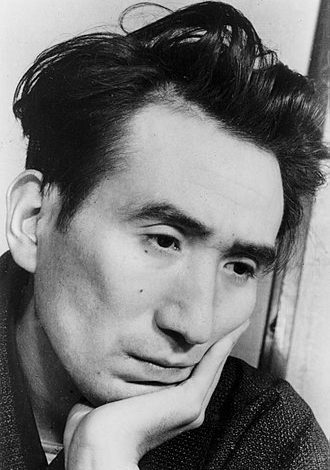Osamu Dazai

Osamu Dazai (太宰 治, Dazai Osamu, June 19, 1909 – June 13, 1948) was a Japanese author who is considered one of the foremost fiction writers of 20th-century. A number of his most popular works, such as The Setting Sun (Shayō) and No Longer Human (Ningen Shikkaku), are considered modern-day classics.[2] With a semi-autobiographical style and transparency into his personal life, Dazai’s stories have intrigued the minds of many readers.
His influences include Ryūnosuke Akutagawa, Murasaki Shikibu and Fyodor Dostoyevsky. While Dazai continues to be widely celebrated in Japan, he remains relatively unknown elsewhere, with only a handful of his works available in English. His last book, No Longer Human, is his most popular work outside of Japan.
Shūji Tsushima (津島修治, Tsushima Shūji), who was later known as Osamu Dazai, was the eighth surviving child of a wealthy landowner[3] in Kanagi, a remote corner of Japan at the Northern tip of Tōhoku in Aomori Prefecture. At the time of his birth, the huge, newly-completed Tsushima mansion where he would spend his early years was home to some thirty family members.[4] The Tsushima family was of obscure peasant origins, with Dazai’s great-grandfather building up the family’s wealth as a moneylender, and his son increasing it further. They quickly rose in power and, after some time, became highly respected across the region.[5]
Dazai’s father, Gen’emon (a younger son of the Matsuki family, which due to “its exceedingly ‘feudal’ tradition” had no use for sons other than the eldest son and heir) was adopted into the Tsushima family to marry the eldest daughter, Tane; he became involved in politics due to his position as one of the four wealthiest landowners in the prefecture, and was offered membership into the House of Peers.[5] This made Dazai’s father absent during much of his early childhood, and with his mother, Tane, being ill,[6] Tsushima was brought up mostly by the family’s servants and his aunt Kiye.[7]
In 1916, Tsushima began his education at Kanagi Elementary.[8] On March 4, 1923, Tsushima’s father Gen’emon died from lung cancer,[9] and then a month later in April Tsushima attended Aomori High School,[10] followed by entering Hirosaki University’s literature department in 1927.[8] He developed an interest in Edo culture and began studying gidayū, a form of chanted narration used in the puppet theaters.[11] Around 1928, Tsushima edited a series of student publications and contributed some of his own works. He even published a magazine called Saibō bungei (Cell Literature) with his friends, and subsequently became a staff member of the college’s newspaper team.[12]
Tsushima’s success in writing was brought to a halt when his idol, the writer Ryūnosuke Akutagawa, committed suicide in 1927. Tsushima started to neglect his studies, and spent the majority of his allowance on clothes, alcohol, and prostitutes. He also dabbled with Marxism, which at the time was heavily suppressed by the government. On the night of December 10, 1929, Tsushima committed his first suicide attempt, but survived and was able to graduate the following year. In 1930, Tsushima enrolled in the French Literature Department of Tokyo Imperial University and promptly stopped studying again. In October, he ran away with a geisha named Hatsuyo Oyama (Oyama Hatsuyo (小山初代)) and was formally disowned by his family.
Nine days after being expelled from Tokyo Imperial University, Tsushima attempted suicide by drowning off a beach in Kamakura with another woman, 19-year-old bar hostess Shimeko Tanabe (Tanabe Shimeko (田部シメ子)). Shimeko died, but Tsushima lived, having been rescued by a fishing boat. He was charged as an accomplice in her death. Shocked by the events, Tsushima’s family intervened to drop a police investigation. His allowance was reinstated and he was released of any charges. In December, Tsushima recovered at Ikarigaseki and married Hatsuyo there.
Soon after, Tsushima was arrested for his involvement with the banned Japanese Communist Party and, upon learning this, his elder brother Bunji promptly cut off his allowance again. Tsushima went into hiding, but Bunji, despite their estrangement, managed to get word to him that charges would be dropped and the allowance reinstated yet again if he solemnly promised to graduate and swear off any involvement with the party. Tsushima accepted the offer.
